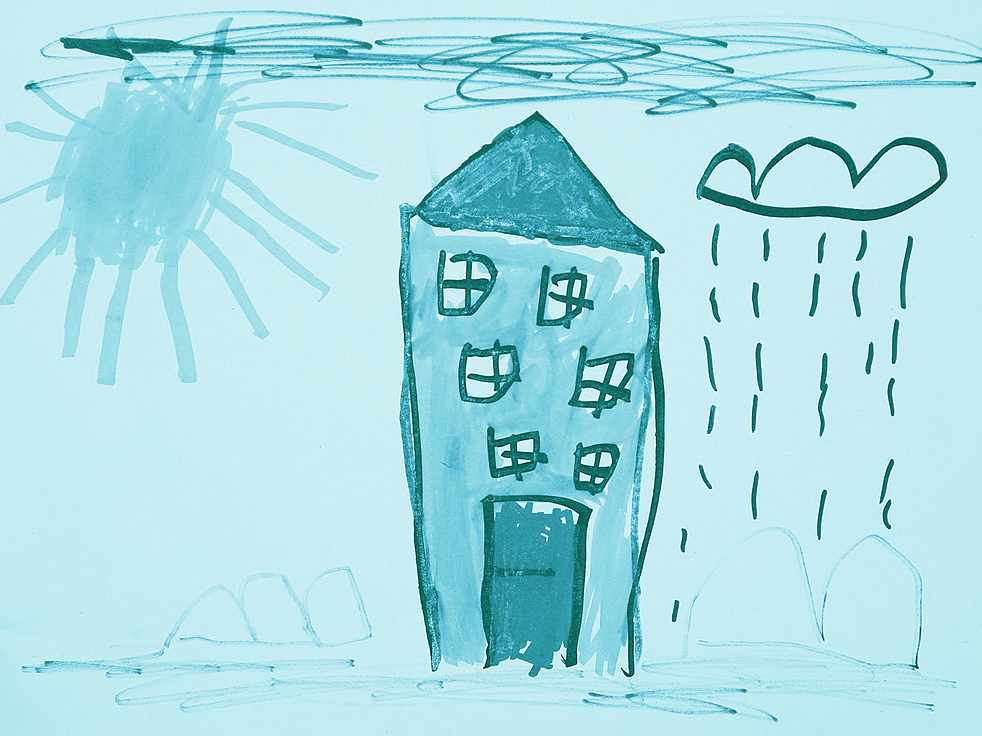Shall I buy a house with my partner?
You face a big decision. There are many factors to consider but don’t forget to think about how the two of you will own it because this can have very serious implications for couples who aren’t married or in civil partnerships. Did you know there’s a choice between:
- Joint tenants and
- Tenants in common?
Joint tenants/tenants in common – what’s the difference?
I will explain in simple terms but if you are at all puzzled please get in touch. And when it comes to the paperwork for buying the house, make sure your conveyancer goes over the difference between joint tenants and tenants in common and gives you lots of time to think about it before you sign. Wrong decisions have consequences.
“Joint tenants” explained …
When I tell clients about being joint tenants I usually draw a picture of a house, let’s say in blue, and then draw exactly the same picture of the house over the top of it, let’s say in red.
Then I say to one of them, you own the blue house, and I say to the other, you own the red house. The point being, you both own the whole thing.
Joint tenants – so what if one of us dies, or we split up?
If one of you dies, the other automatically inherits. And if you split up, it’s equal shares.
But I’m putting more in, I want a bigger share!
Owning as joint tenants might not be right for you if you put in more money at the start, or will be paying all the mortgage. Tenants in common may be the answer.
“Tenants in common” explained …
Remember the little house I drew to explain joint tenants? Well in the case of tenants in common imagine a house, one side drawn in blue, the other side in red. One of you owns the blue side, the other owns the red side. A declaration of trust can set out the shares you own it in and what happens if you split up. See more about declarations of trust below.
Tenants in common – what happens if one of us dies?
If one of you dies, their share goes under the terms of their will. This doesn’t suit everyone because you can’t guarantee who your partner is going to leave their share to. A cohabitation agreement might help (see more below). But owning as tenants in common, and having a declaration of trust, protects the money you invested in the property if you split up.
Tenants in common – what happens if we split up?
You can own the property in equal or unequal shares, depending on how you contributed to the purchase. Your declaration of trust will set this out. So if you split up you will know what you are entitled to.
Is there anything else you need to do? Well, yes, there is. You need to make a will.
Make a will …
Why do you need to make a will? Because if you own the property as tenants in common and one of you dies, the survivor doesn’t automatically inherit the house. See my recent blog Do I need a will, here’s one very good reason.
Anything else? Well, yes, a cohabitation agreement might be a good idea.
Get a cohabitation agreement …
See my blogs 6 reasons why you need a cohabitation agreement and 6 things you must include in a cohabitation agreement
“Declaration of trust” explained …
This is a document which sets out your respective interests in the property and what happens if you split up.
Shall I buy a house with my partner?
Contact Family Lawyer Joanne Houston on 01962 217640 for an initial free of charge consultation on the question Shall I buy a house with my partner? In this 20 minute session she will review your situation and how you can achieve your objectives.
JUST FAMILY LAW are specialist divorce and family lawyers. We offer Pay as you go costs. We offer Collaborative law solutions tailored to your family’s needs.
The topics covered in this blog post Shall I buy a house with my partner? are complex. They are provided for general guidance only. If any of the circumstances mentioned in this blog apply to you, seek expert legal advice.
image for Shall I buy a house with my partner? Norsk bokmål: yellow house child drawing by Oyvind Holmstad on Wikimedia


2 thoughts on “Shall I buy a house with my partner?”